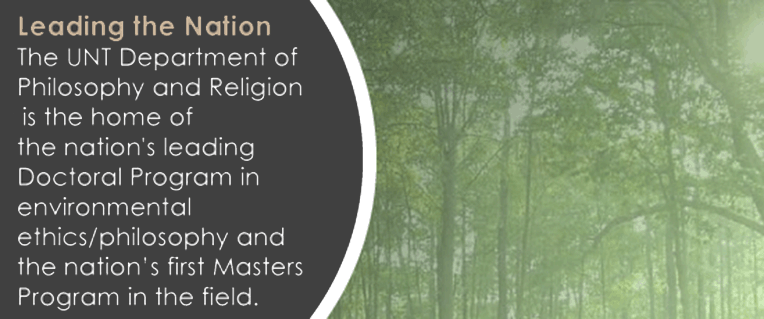
The Department of Philosophy and Religion is the leading graduate program nationally and internationally in environmental ethics and social and environmental philosophy. The department offers the Master of Arts with a major in philosophy and the Doctor of Philosophy with a major in philosophy.
The Department of Philosophy and Religion oversees one of the world's leading doctoral programs in environmental ethics and philosophy. Foundational training in the history of Western philosophy and religion provides the basis for specializations such as environmental justice, philosophy of ecology, eco-phenomenology, and eco-feminism while fostering interdisciplinary experiences.
The master's degree is appropriate for students wishing to develop master's-level expertise in philosophy before pursuing doctoral studies in philosophy or related fields. It also provides an excellent background for students planning careers in law, policy, environmental science, public and private sector environmental firms, and non-governmental organizations.
Graduate courses in philosophy may also be taken as part of the Master of Science in Interdisciplinary Studies through the Center for Interdisciplinary Graduate Studies of the Toulouse Graduate School. This program permits students, in close consultation with a faculty advisor, to create their own degree plans, which involve study in three or more related areas. This degree can be completed in one year including summer. Philosophy courses also may be taken as a minor on the master's degree in other disciplines and as a minor or supporting work on the doctorate.
Career opportunities for students who successfully complete the UNT PhD in philosophy and religion are diverse. Students interested in specializing in social and environmental ethics and philosophy will be well positioned to find jobs in academe as demand for specialists in this exciting and expanding new subfield of philosophy increases.
Because of its high concentration of specialists in the field of social and environmental philosophy, the department offers humanists, scientists, and professionals unique opportunities for postdoctoral work and professional development through independent study and research.
Inquiries should be directed to Dr. Adam Briggle, the Director of Graduate Studies.
- The department is committed to philosophy that engages with real-world issues, especially pertaining to the environment, climate, energy, and technology.
- We are home to the first journal in the field, Environmental Ethics (founded 1979).
- We pursue a number of research projects, including the Sub-Antarctic Biocultural Conservation Program, the Philosophy of Water Project, The Philosophy of Food Project, and the Philosophy with Children Project.
- We are also home to the world's first field station in environmental philosophy, science, and policy at Cape Horn, Chile.